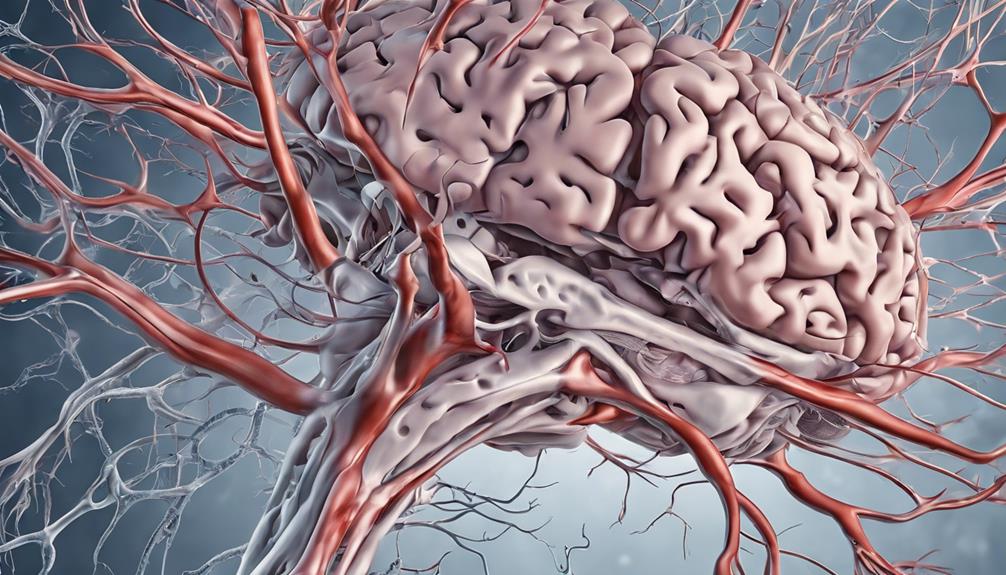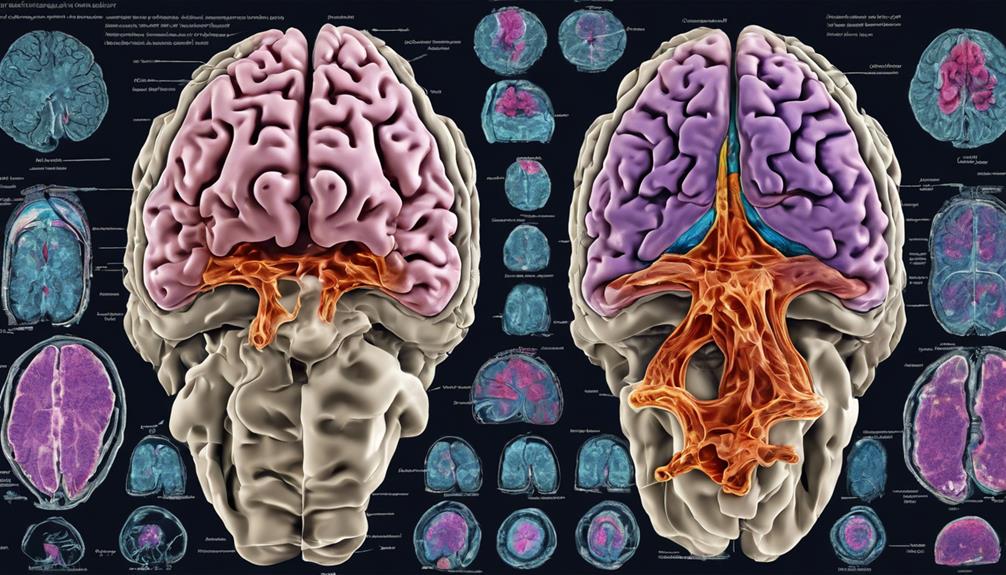Investigating the possible benefits of using Depakote to address difficult behaviors linked to dementia involves delving into the intricacies of its off-label usage. Although some caregivers and medical professionals have observed enhancements in mood and reduction in aggression among individuals with Alzheimer’s disease, the efficacy of Depakote in easing behavioral symptoms of dementia is still a subject of debate.
By delving into the mechanisms of action, efficacy in cognitive function, and considerations for use, we can gain a better understanding of the role Depakote plays in the management of dementia-related behaviors.
Key Takeaways
- Depakote benefits mood, aggression, seizures in Alzheimer's.
- Enhances GABA levels, modulates neurotransmitters for behavioral symptoms.
- Limited efficacy in cognitive function improvement.
- Requires careful monitoring for side effects and dosage adjustments.
Benefits of Depakote for Dementia
Despite its limited efficacy in treating challenging behaviors associated with dementia, Depakote (divalproex sodium) is sometimes prescribed to Alzheimer's patients, given its potential benefits in managing certain symptoms. While it may not significantly reduce agitation or behavioral symptoms, some clinical evidence suggests that Depakote could be beneficial in addressing specific symptoms associated with dementia.
In a clinical setting, healthcare providers may consider prescribing Depakote to manage symptoms like mood changes, aggression, or certain types of seizures that can occur in Alzheimer's patients.
Although the primary use of Depakote isn't for treating dementia-related behavioral issues, some patients may experience improvements in specific symptoms, leading to an overall enhancement in their quality of life. Careful monitoring is essential due to the potential side effects, such as drowsiness and dizziness, which can impact the daily functioning of Alzheimer's patients. By weighing the clinical effects and side effects of Depakote, healthcare professionals can make informed decisions about its usage in dementia patients.
Mechanism of Action

The mechanism of action of Depakote involves enhancing the neurotransmitter GABA in the brain to stabilize mood. This modulation of GABA levels is crucial in managing challenging behaviors associated with dementia, especially in Alzheimer's patients. Divalproex sodium, the active ingredient in Depakote, acts on neuronal pathways, impacting various neurotransmitters to help reduce aggressive behavior and alleviate behavioral disturbances common in dementia. Understanding how Depakote works at a neurochemical level provides valuable insights for caregivers and healthcare providers when developing tailored treatment strategies for individuals experiencing behavioral changes related to dementia.
Key Points:
- Depakote enhances GABA levels in the brain to stabilize mood.
- Divalproex sodium impacts neuronal pathways to alleviate behavioral disturbances.
- Modulation of neurotransmitters by Depakote helps reduce aggressive behavior in Alzheimer's patients.
- The mechanism of action of Depakote is essential in managing challenging behaviors in dementia.
Efficacy in Cognitive Function
When evaluating the efficacy of Depakote in cognitive function for individuals with dementia, research findings consistently indicate a lack of significant improvement in cognitive abilities. Studies on Valproate therapy have shown that it doesn't slow cognitive decline or enhance cognitive function in dementia patients. Cognitive assessments of individuals undergoing Valproate treatment haven't demonstrated notable positive changes in cognitive performance.
Despite its effectiveness in managing behavioral symptoms, Depakote isn't considered a medication for improving cognitive function in dementia patients. Research suggests that Valproate treatment doesn't lead to cognitive improvement and is generally ineffective in addressing cognitive symptoms associated with dementia. Therefore, when considering the use of Depakote in patients with dementia, it's crucial to understand that its primary role lies in managing behavioral aspects rather than fostering cognitive enhancement.
Managing Behavioral Symptoms

Valproate (Depakote) is occasionally prescribed off-label for managing challenging behavioral symptoms in dementia. When considering the use of Depakote for behavioral symptoms in dementia, healthcare providers should keep the following points in mind:
- Limited Efficacy: Research studies suggest that Valproate may not be more effective than a placebo for reducing challenging behaviors in dementia. Therefore, its use should be carefully evaluated based on individual patient needs.
- Common Side Effects: Common side effects of Depakote include drowsiness and dizziness. More severe effects such as liver damage are also possible, emphasizing the importance of monitoring patients closely.
- Dosage Adjustment: Depakote dosage is typically initiated at a low level and adjusted gradually based on the patient's response. Healthcare providers should closely monitor patients for both therapeutic effects and adverse reactions.
- Regular Monitoring: Regular monitoring by healthcare providers is essential to assess the effectiveness and side effects of Depakote in managing behavioral symptoms of dementia. This monitoring ensures optimal outcomes and patient safety.
Considerations and Side Effects
Considering the limited efficacy and common side effects associated with Depakote for managing challenging behaviors in dementia, careful consideration of alternative strategies is crucial for optimal patient care.
Depakote, also known as divalproex sodium, has been shown to be generally ineffective in treating challenging behaviors in dementia, as studies suggest that Valproate isn't more effective than a placebo. Common side effects of Depakote include drowsiness and dizziness, while more severe side effects such as liver damage and pancreatitis can occur.
When using Depakote for agitation in Alzheimer's patients, healthcare providers typically start with a low dosage and gradually increase it based on the individual's response. Regular monitoring is essential to evaluate both the effectiveness and potential side effects of Depakote, allowing for necessary adjustments in dosage to optimize patient outcomes.
Healthcare providers play a critical role in monitoring and assessing the use of Depakote in dementia patients to ensure safe and effective care.
Frequently Asked Questions
What Do They Give Dementia Patients to Calm Them Down?
When dementia patients exhibit agitation or aggression, healthcare providers may prescribe medications to help manage these behaviors. These medications aim to calm the individual and improve their quality of life.
It's essential to monitor the patient's response to the medication and report any changes to the healthcare team promptly. Caregivers play a crucial role in observing the effectiveness and potential side effects of these medications to ensure the best care for the patient.
What Is Depakote Used for in the Elderly?
In the elderly, Depakote is sometimes used off-label to help stabilize mood and reduce aggressive behavior. It's important to note that research studies suggest it may not be more effective than a placebo in treating challenging behaviors in dementia.
Common side effects include drowsiness and dizziness, with more serious effects like liver damage and pancreatitis.
Dosage typically starts low and is gradually increased based on individual response, with regular monitoring by healthcare providers essential.
What Are Mood Stabilizers for Dementia Patients?
Mood stabilizers for dementia patients aim to stabilize mood and reduce behavioral challenges. These medications, like Valproate, work by enhancing neurotransmitter function. While studies show limited efficacy compared to a placebo, they're still commonly used.
Starting with low doses and closely monitoring levels is crucial. Divalproex sodium, a form of Valproate, is widely prescribed for managing agitation in dementia patients. Proper administration and dosage adjustments are essential for optimal outcomes.
What Are the Top 3 Drugs for Dementia?
We believe the top 3 drugs commonly used for dementia are:
- Cholinesterase inhibitors like Donepezil (Aricept)
- Memantine (Namenda)
- Antipsychotics such as risperidone (Risperdal).
These medications are tailored to address memory issues, regulate brain activity, and manage challenging behaviors in dementia patients.
It's crucial for healthcare providers to closely monitor the effects and potential side effects of these drugs to ensure optimal care for individuals with dementia.
Conclusion
In conclusion, while Depakote may offer some benefits for managing challenging behaviors in dementia patients, its efficacy is limited and comes with potential side effects. Caregivers should approach its use cautiously, monitoring for any changes in behavior or mood.
Symbolically, Depakote is like a delicate balance beam, requiring careful attention and adjustment to ensure the safety and well-being of those navigating the complexities of dementia care.
Open communication with healthcare providers is key to addressing any concerns promptly.









